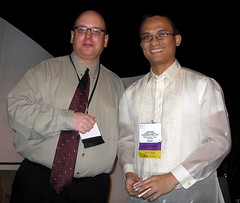The majority of Filipinos are not "wired." But this is no excuse for librarians to ignore what is already—or will eventually become—users' first option when looking for information. Librarians can also use the latest trends (e.g., blogging) to "speak" the language of their customers or even for their own professional development.
In 2002, I had no idea who
Gary Price was when I bought a book he co-authored called
The Invisible Web
. But by the time I saw that he was going to be a speaker for several sessions this year, I knew enough about him to know that I
had to attend at least one of them—and that I wanted to have my picture taken with him. In "Gary Price—the newest and the best from the one who knows" (see
webpage with links to recommended sites), Price joked that the Invisible Web—which, according to the book, "consists of material that general-purpose search engines either cannot or, perhaps more importantly
will not include in their collections of Web pages" (p. xxii)—has come to refer to any results beyond the first five! Some of his more interesting points were:
- Not only is Yahoo! getting better, but it's also moving faster than Google. Check out Yahoo! Search, which has a Google-like interface, and Yahoo! Mindset, which allows users to specify how to sort results by using a "slider."
- Demonstrate just how different results from different search engines are by using Thumbshots Ranking (e.g., Filipina) and Dogpile's Missing Pieces Tool.
- Conduct more specific searches through vertical or specialized search engines like ZoomInfo (contact information for people), Answers.com (results organized according to use) and RedLightGreen (find out if a book is available in nearby libraries).
Mary Ellen Bates was another speaker with multiple sessions. And her session was very similar to the one with Gary Price—but, to use an analogy, he was Yahoo!, and she was Google. In "60 Tips in 90 Minutes" (
pdf), Bates covered some material that Price already mentioned, but there was also a
lot more that was different (sounds like search engines, right?). And then there were those that she highlighted that complemented what Price discussed (e.g., YaGoohoo!gle, which has
morphed into
Twingine). She recommended the following sites:
- Furl, which allows you to bookmark Web pages, add titles, et al., and save a copy of the page;
- FaganFinder's The Google Ultimate Interface, which puts together on one page all of Google's searching options—including Advanced Search and non-Roman characters; and
- Incoming Links, which is intended for webmasters and bloggers, but which she recommended for its Directory of Directories, a list of 613 topical directories that are more likely to contain links to sites that would probably appear as the umpteenth results in general search engines—if they appear at all.
"Blogging/RSS'ing the Librarian Way" was a standing-room-only session. There were supposed to be three speakers, but
Jenny Levine (
ppt slides) had to cancel because of a family emergency. Marie Kaddell (
ppt slides) spoke about trends in blogging and RSS, while
Catherine Lavallee-Welch (
ppt slides) focused on the use of blogs for professional development. The latter presentation was the most helpful for me because while I have benefitted greatly from blogging—e.g., constant updating, improved writing, "meeting" people—I never quite looked at blogging as a means for professional development. For more detailed notes, see "
SLA2005 - blogging about blogging - Monday 11:30."
Tag:
SLA2005


